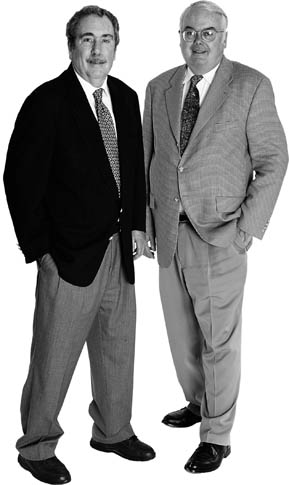contents
A Letter from the Dean
Public Offerings
GE’s Immelt addresses donors, Abraham George feted for social entrepreneurship, experts demystify derivatives, Nobel Laureate Ed Prescott leads discussion on Japan, branding gurus debate iconic brands, and Microsoft lawyer testifies re: company’s legal battles
Stern in the City
Leonardo LoCascio’s vintage business plan, By Jenny Owen
Julie Chaiken dresses for success, By Rika Nazem
A Life in Turnaround
8 questions for Tony Alvarez
Cover Story – Under the Tuscan Sun
The Global Alumni Conference in Florence provides a forum to discuss globalization, re-connect, and appreciate fine Italian art, food, and wine, By Daniel Gross
Leading Indicators
Stern’s CEO Series: Sharon Allen of Deloitte & Touche accounts for her success, and Matt Blank of Showtime Networks presents the case for cable
Prospectus
New faculty appointments, noteworthy papers, awards, and honors
Office Hours –
Faculty
Research
The Business of Business Education
Stern’s dean makes the case for fundamental research, By
Thomas F. Cooley
Comparative Capitalism
What accounts for Europe’s and America’s different attitudes toward the free market? By Augustin Landier, David Thesmar, and Mathias Thoenig
The Alchemy of LBOS and IPOs
How to think about private equity today, By Ingo Walter
To Guide or Not to Guide
An investigation shows that investors suffer when firms stop giving quarterly earnings guidance, By Joel F. Houston, Baruch Lev, and Jennifer Tucker |
Peer to Peer -
Student Life in Washington Square and Beyond:
Tutoring aspiring businesswomen, preventing homelessness, a Cannes debut, and making luxury industry connections
Alumni Affairs -
Alumni News and Events: Reports from the Global Alumni Conference and Alumni Reunion Weekend, Alumni Affairs and Annual Giving merge, Stern in India, and online career resources
Class Notes
Past Performance
Edwin Elton and Martin Gruber, Stern’s Dynamic Duo, By Daniel Gross |
|


Marty Gruber (left) and Ned Elton have been collaborating
for 42 years, producing the best-selling finance textbook. |
Dynamic
Duo
By Daniel Gross
In 1965, Larry Ritter, then
the chairman of NYU Stern’s finance department, hired a group of young academics
and tasked them with designing a curriculum. After courses
ended, the young professors would hang out at McCann’s
Bar, around the corner from the School’s building at
100 Trinity Place. “All the new faculty members did things
together,” said Edwin (Ned) Elton, who was finishing
his thesis at Carnegie-Mellon when he joined the faculty. One
night, Elton and Martin (Marty) Gruber, a chemical engineer
out of MIT who received his PhD from Columbia, got into a friendly
argument over the effect of share repurchases. Both went home
bent on proving the other wrong. “We came in with big
proofs, and that became our first journal article,” recalled
Gruber. “That started the collaboration, and we’ve
been collaborating ever since.”
For 42 years, Elton and Gruber – who now are both Nomura
Professors of Finance and who, respectively, have led Stern’s
doctoral program for the last 12 years and chaired Stern’s
finance department from 1989 to 1997 – have engaged in
a most productive academic partnership. They co-authored the
best-selling finance textbook, Modern
Portfolio Theory and Investment Analysis, which is now in its 7th edition. Together,
the duo has published two other books and about 100 journal
articles. In 1999, MIT Press published two volumes of their
research. Among their favorites: a paper on ex-dividend returns
and an article on simple rules for portfolio analysis, published
in the Journal of Finance.
Elton and Gruber (who sometimes receive mail addressed to Professor
Elton Gruber) live near one another in Ridgewood, New Jersey,
where Elton converted the second floor of a barn in the back
of his house into an office where they both work.
A great deal has changed at NYU Stern
since the mid-1960s, when Gruber taught future Federal Reserve
Chairman Alan Greenspan (BS ’48, MS ’50, PhD ’77)
in a doctoral course. Among the most significant changes:
the understanding that students had to be versed in quantitative
economics before they could understand finance, and a shift
from the basic corporate finance course to one that stressed
the underlying disciplines of instruments and markets.
To a large degree, the success of their
continued collaboration relies on the same dynamic that led
to their first paper in 1965: respectful disagreement, backed
up by research. “I
think the reason we have worked together so long is that we
rarely agree about anything,” said Gruber. “We’re
still trying to prove that the other guy is wrong. And our
articles come out better as a result, because it’s like
having peer review all the way through.”
And who has won more of
the arguments? “Each will tell
you that he has won more,” said Elton. “But part
of our good working relationship is that we keep our disagreements
between ourselves.”
Daniel Gross is editor of Sternbusiness.
|
|


![]()